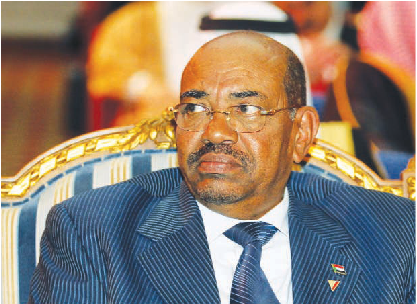Inability of African countries to surrender President Omar al-Bashir of Sudan to ICC puts the region at odds with the UN’s effort to sanitise the continent’s culture of political gangsterism and lawlessness, writes Correspondent, SAM NWOKORO.
During the week, President of Sudan, Omar al-Bashir, once again defied global opinion to appear before the International Criminal Court (ICC) at The Hague to answer charges of genocide against his own people in the 1990s. He has been on the watch-list of ICC since March 2009, and another warrant for his arrest was issued on July 12, 2010. He had managed to attend the last African Union (AU) summit which held recently in Pretoria, South Africa, though he was not formally invited. Since the past six years that the ICC had been seeking co-operation of heads of African countries to get Al-Bashir docked for genocide and human rights violations in Darfur in the 90s, no breakthrough had been recorded.
While in Pretoria for the AU summit which held from June 7 to 15, 2015, a group of concerned human rights activists pushed to seize him, urging the South African authorities to detain him and not allow him leave Pretoria until ICC comes to whisk him. They went to a South African high court to push for the case. According to agency reports, “a high court in North Gauteng, South Africa barred al-Bashir from leaving the country while a group pursues a case to determine the fate of ICC warrant (for Bashir’s arrest), according to the spokesman of the legal team”. However, al-Bashir beat the trap and made his way home before security agents in South Africa could enforce the court order to nab him.
The Sudanese strong man was reportedly the architect of the genocide and ethnic cleansing in Darfur region of the country. Undeterred by his arrest warrant, al-Bashir continues with his impunity, expanding his bombings and attacks against civilians beyond Darfur to those in the Sudanese state of Blue Nile and southern Kordofan.
Virtually all African countries are signatories to the Rome Convention mandating all member nations to co-operate in the ICC investigations and prosecutions against anyone charged for genocide, human right violations and war crimes.
Why African nations dither
AU heads of government said the union already has adopted an official policy which requires its member states not to cooperate with the ICC because they perceive the body as being biased against Africa, since all its indictments to date have been against African leaders.
Al-Bashir, former army colonel who came to power via 1989 coup, stands accused of war crimes, crime against humanity and genocide, the updated ICC 2013 warrant stated. Arrest warrants from 2009 to 2010 outlined the case against Al-Bashir and alleged that, during the Darfur conflict, he ordered the military, police and the Islamic Janjaweed militia to attack three ethnic groups deemed sympathetic to rebel outfits “with the specific instruction to destroy those groups”.
As part of that campaign, the warrant says the Sudanese president ordered the rape, murder and torture of civilians and the razing of villages. The United Nations (UN) estimates that as many as 300,000 people have been killed in the Darfur conflict since 2003, a figure the Sudanese government says is inflated. Another seven million are in need of humanitarian assistance, the UN High Commission for Refugees said.
Shortly before the AU summit in Pretoria, the UN Assistant Secretary General for Peace Keeping Operations told the Security Council that the ongoing operations in Darfur have a devastating impact on civilians. UN High Commission for Refugees says more than 76,000 civilians have been displaced this year alone.
However, it seemed the AU members are no longer keen on handing over Al-Bashir to ICC, something that has been bolstering Bashir’s care-free attitude towards UN resolutions over the Darfur conflict. Agency reports say that al-Bashir returned from the AU summit in Pretoria and received heroic welcome in Khartoum, even after the South African court had ordered his arrest, though the ruling came after he had left.
Sudanese Foreign Minister, Ibrahim Ghandour, added to the chest-beating, saying: “The president will continue his participation in international events as usual, and the attempt to distract us will not sway us.”
Implications of AU’s stand
The AU has always flaunted the concept of Head of State’s immunity to shield Al-Bashir. At other times, it has often claimed that its African Criminal Court is capable of trying erring African heads of state than submitting the pride and sovereignty of African states to the already “biased” western criminal courts such as ICC.”
AU’s disposition stems from same old theory of the continental body’s doctrine of non-interference in African affairs. But experience has shown that the continent has, for a long time, depended on foreign aid and is even poor at managing such aid to the benefit of their people.
“Many African states are being ruled by sit-tight corrupt leaders. So the AU’s policy of non-cooperation with ICC over series of its efforts to bring some African leaders to book is only self-serving. They are only protecting themselves. Most of them are as guilty as Al-Bashir and we have seen what happened in recent time in Egypt, Sierra Leone, Kenya and Niger, and many of them are like that. So AU is only shielding its dirty records in the eyes of the world,” says a Sudanese Human Rights defender, Amir Suleiman.
The co-founder of African Centre for Justice and Peace Studies (AC/JPS) has been in Kampala since 2009 when he was forced to flee his home country out of fear of government prosecution for his works on human rights and international justice issues.
In an attempt to avoid inviting Al-Bashir to the AU summit in Malawi in 2009, the then government under President Joyce Banda and Vice President Khumbo Kachali had insisted: “One of the primary objectives of AU is to achieve peace and security in Africa.”
Specifically, both maintained that “the constitutive Act of AU provides a legal framework for the continental organ to fight impunity. Article (4h) and (0) of the Act authorises a member to intervene in member states to stop war crimes, genocide, crimes against humanity and to prevent impunity”.
According to Banda, Malawi’s decision not to invite Al-Bashir to the summit is in line with the country’s responsibility under the Rome Convention of the International Criminal court, insisting that: “As an ICC member state, Malawi is obliged to cooperate fully with ICC in its investigation and prosecution of war crimes against humanity and genocide, and, where requested, to re-arrest Al-Bashir and any other suspect wanted by ICC if he visits the country, and surrender him to court.” Bashir did not attend that summit, having learnt that Malawian authorities would arrest him and hand him over to ICC.
The Nigeria treatment
The arrest of Al-Bashir has posed a problem for AU member states since 2009 when the international community sought to exorcise the ghost of Darfur crisis as a way of charting a new course for the beleaguered country. The incumbency of Al-Bashir has become a sort of thorn in the flesh of both UN and the powerful western allies like Washington which would want to see Al-Bashir prosecuted for war crimes.
Since after the UN intervention that failed to remove Al-Bashir and stop much of the repressions of Khartoum, nabbing Al-Bashir has been problematic – as most Arab countries in Africa shield him in diverse ways. Having been a huge supplier of oil and gas to most impoverished countries in Africa, Al-Bashir does not find it difficult to thwart efforts to get him account for his atrocities in Darfur. Just like Charles Taylor, his deep pocket has been his strength.
But no country, it appears, among the AU member states had been able to play the trick former President Olusegun Obasanjo used to get Taylor nabbed by UN-sponsored Interpol that had hunted him for years since the Liberian crisis that saw his ouster in 1994.
He had come to Nigeria to seek asylum. Eventually, concerted local and international pressure mounted on Obasanjo (then Nigeria’s president) to arrest Taylor and submit him to the UN crime court. Obasanjo was boxed between obeying AU (then Organisation of African Unity) articles on immunity and obeying UN’s demand regarding the Rome Convention to which Nigeria was also a signatory. Taylor was moved from Abuja, the federal capital, to Calabar, capital of Cross River State. While there, Nigeria’s intelligence community had spooked him to leave the country after detailing the UN prosecutors about his escape route. The Interpol waited for him at the border between Nigeria and Cameroun where Taylor walked into the waiting arms of UN prosecutors and Nigeria was hailed for cooperating with the hunt for Taylor.
Darfur’s route to Al-Bashir’s torment
The negligence of Darfur, a region of Western Sudan, became more deliberate, as majority of the resources were directed towards the Arab population along the Nile up north, mostly near Khartoum, the capital of Sudan. The environmental degradation and continued pattern of structural, social inequality and underdevelopment resulted in economic hardship.
Darfur was an independent kingdom established in the 14th century until it was annexed to Sudan in 1916.The vast majority of Dafurians identify themselves primarily as Africans. As Sudan became increasingly ‘Arabised’, the Dafurians were intentionally marginalised in the remote and impoverished region. Sudanese investments remained primarily east of the Nile Valley, leaving the western region, Darfur in particular with scant resources. This inequality led to increased tension between the Arabs and Africans since the 1960s.
Failure of successive governments to stabilise the region resulted in continuous violence that culminated in an armed resistance movement beginning with Dawoud Yahya Bolad. The overall situation worsened from 1990s to 2002. In February 2005, the Darfur Liberation Movement was announced and quickly changed its name to the current Sudan Liberation Movement (SLM/A) which accused the government of neglecting Darfur. Consequently, the SLA staged a rebellion against the central government and was initially very successful. In reaction, the Sudanese government quickly armed Arab militias known as Janjaweed (devils on horseback) to crush the rebellion.















